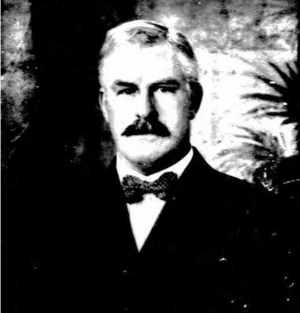Difference between revisions of "Roger Farnham"
m (add image) |
(tidy) |
||
| (One intermediate revision by the same user not shown) | |||
| Line 17: | Line 17: | ||
|alma_mater= | |alma_mater= | ||
|political_parties= | |political_parties= | ||
| − | |employment= | + | |employment={{job |
| + | |title=Propagandist | ||
| + | |start=1898 | ||
| + | |end=1911 | ||
| + | |description=Heavily involved in the [[Panama canal]] scam | ||
| + | |employer=Sullivan & Cromwell | ||
}} | }} | ||
| − | '''Roger Leslie Farnham''' was a U.S. corporate lawyer who worked for [[Sullivan & Cromwell]].<ref>https://ia802607.us.archive.org/4/items/untoldstoryofpan012635mbp/untoldstoryofpan012635mbp.pdf</ref> | + | }} |
| + | '''Roger Leslie Farnham''' was a U.S. corporate lawyer who worked for [[Sullivan & Cromwell]].<ref name=untold>https://ia802607.us.archive.org/4/items/untoldstoryofpan012635mbp/untoldstoryofpan012635mbp.pdf</ref> | ||
==Career== | ==Career== | ||
| − | Farnham | + | Farnham started his journalistic career on the Wall Street staff of [[Joseph Pulitzer]]'s ''World''. |
| + | |||
| + | In [[1898]], Farnham was hired as press bureau chief for a special bureau designed to propagandize for a [[Panama canal|canal through the Panama isthmus]] (in which Cromwell had a business interests) over a cheaper and shorter canal solution in [[Nicaragua]]. Farnham also doubled as adjunct to the several members of the Cromwell law firm who spent weeks on end in [[Washington]] enlightening members of Senate and House and Administration officials. Farnham also managed the publicity around the [[Panamanian]] "revolution" and declaration of independence from [[Colombia]].<ref name=untold/> | ||
| + | |||
| + | In [[1909]], Farnham and [[Jonas M. Whitley]], were the fronts for a $400,000,000 timber concession in Panama, where it was suspected that Cromwell was the principal because Farnham was known in Panama as "Cromwell's man." Farnham had engineered the concession almost through the Panama legislature before public denunciation of the project as a "steal" caused it to be quietly put asleep.<ref name=untold/> | ||
| + | |||
| + | [[Frank A. Vanderlip]] recruited him to [[National City]] (a predeccessor of [[Citibank]]) in [[1911]]. | ||
In [[Haiti]], Farnham worked for [[National City]], controlling the Haitian national bank. Farnham lobbied officials in Washington on behalf of the bank, and eventually took charge of all its Caribbean operations, including in [[Haiti]].<ref name=repeating>https://repeatingislands.com/2012/06/18/on-citigroups-anniversary-dont-forget-its-brutal-past-in-haiti/</ref> | In [[Haiti]], Farnham worked for [[National City]], controlling the Haitian national bank. Farnham lobbied officials in Washington on behalf of the bank, and eventually took charge of all its Caribbean operations, including in [[Haiti]].<ref name=repeating>https://repeatingislands.com/2012/06/18/on-citigroups-anniversary-dont-forget-its-brutal-past-in-haiti/</ref> | ||
Latest revision as of 09:04, 18 November 2022
(lawyer) | ||||||||||||||
|---|---|---|---|---|---|---|---|---|---|---|---|---|---|---|
 | ||||||||||||||
| Born | 1864 | |||||||||||||
| Died | June 5, 1951 (Age 86) | |||||||||||||
| Nationality | US | |||||||||||||
Sullivan & Cromwell bagman
| ||||||||||||||
Roger Leslie Farnham was a U.S. corporate lawyer who worked for Sullivan & Cromwell.[1]
Career
Farnham started his journalistic career on the Wall Street staff of Joseph Pulitzer's World.
In 1898, Farnham was hired as press bureau chief for a special bureau designed to propagandize for a canal through the Panama isthmus (in which Cromwell had a business interests) over a cheaper and shorter canal solution in Nicaragua. Farnham also doubled as adjunct to the several members of the Cromwell law firm who spent weeks on end in Washington enlightening members of Senate and House and Administration officials. Farnham also managed the publicity around the Panamanian "revolution" and declaration of independence from Colombia.[1]
In 1909, Farnham and Jonas M. Whitley, were the fronts for a $400,000,000 timber concession in Panama, where it was suspected that Cromwell was the principal because Farnham was known in Panama as "Cromwell's man." Farnham had engineered the concession almost through the Panama legislature before public denunciation of the project as a "steal" caused it to be quietly put asleep.[1]
Frank A. Vanderlip recruited him to National City (a predeccessor of Citibank) in 1911.
In Haiti, Farnham worked for National City, controlling the Haitian national bank. Farnham lobbied officials in Washington on behalf of the bank, and eventually took charge of all its Caribbean operations, including in Haiti.[2]
In 1914, Farnham, who once described the Haitian people as "nothing but grownup children," drafted a memorandum for William Jennings Bryan — then U.S. secretary of state — arguing for military intervention as a way of protecting American interests in Haiti. Sending troops, Farnham insisted, would not only stabilize the country, but be welcomed by most Haitians.That summer, Bryan cabled the U.S. consul in Cap-Haitien, stating that he "earnestly desired the implementation of Farnham’s plan."[2]
Meanwhile, Farnham and National City worked to destabilize the Haitian government. They refused to pay government salaries over the summer, and in December they ordered the transfer of $500,000 of the republic’s gold reserves to National City’s vaults at 55 Wall St. The gold was packed up by U.S. Marines, marched to Port-au-Prince’s wharfs and shipped aboard the USS Machias to New York.[2]